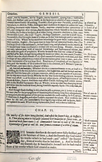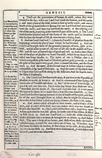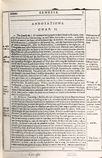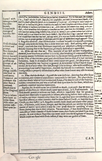The work of six days being finished, God rested the seventh day and blessed it. (8) Then placing man in paradise (planted with beautiful and sweet trees, and watered with four rivers) (16) commandeth him not to eat of the tree of knowledge of good and evil. (18) And formed a woman of a rib of Adam.
THE heavens therefore and the earth were fully finished, and all the furniture of them. 2And the seventh day God ended his work which he had made; and [a] rested • the seventh day, from all work that he had done. 3And he blessed the seventh day and sanctified it: because in it he had ceased from all his work which God created to make.
4These are the generations of heaven and earth, when they were created in the day, when our Lord God made the heaven, and the earth, 5and every plant of the field, before it shot up in the earth, and every herb of the ground before it sprang. For our Lord God had not rained upon the earth; and man was not to till the earth. 6But a spring rose out of the earth, watering all the overmost part of the earth. 7Our Lord God therefore formed man of the slime of the earth: and [b] breathed into his face the breath of life, and man became a living soul.
8And our Lord God had [c] planted a Paradise of pleasure from the beginning: wherein he placed man whom he had formed. 9And our Lord God brought forth of the ground all manners of trees, fair to behold, and pleasant to eat of: the tree of life also in the middle of Paradise: and the tree of knowledge of good and evil. 10And a river issued out of the place of pleasure to water Paradise, which from thence is divided into four heads. 11The name of one is Phison: that is it which compasseth all the land of Hevilath, where gold groweth. 12And the gold of that land is very good: there is found bdelium, and the stone onyx. 13And the name of the second river is Gehon: that is it which compasseth all the land of Ethiopia. 14And the name of the third river is Tygris; that same passeth along by the Assyrians. And the fourth river, the same is Euphrates.
15Our Lord God therefore took man, and put him in the Paradise of pleasure, to work, and keep it. 16And he commanded him saying: Of every tree of Paradise eat thou: 17But • of the tree of knowledge of good and evil • eat you not. For in what day soever thou shall eat of it, • thou shalt die the death. 18Our Lord God also said: It is not good for man to be alone: let us make him a help like unto himself. 19Our Lord God therefore having formed of clay all beasts of the earth, and fowls of the air; brought them to Adam, that he might see what to call them: for all that Adam called any living creature, the same is his name.
20And Adam called all beasts by their names, and all fowls of the air, and all cattle of the field: but unto Adam there was not found a helper like himself. 21Our Lord God therefore cast a dead sleep upon Adam: and when he was fast asleep, he took one of his ribs, and filled up flesh for it. 22And our Lord God [d] built the rib which he took of Adam into a woman, and brought her to Adam. 23And Adam said: This now is bone of my bones, and flesh of my flesh: she shall be called woman, because she was taken out of man. 24Wherefore man shall leave his father and mother, and shall cleave to his wife, and they shall be [e] two in one flesh. 25And they were both naked, to wit Adam and his wife; and were not ashamed.
Footnotes
- ^ God createth not new kinds of creatures, yet still worketh, Joh. 5:17, conserving and governing all things, and created souls, grace, and glory of the same kind, St. Aug. lib. 4. de Gen.ad lit. ch. 12.
- ^ Man’s soul is immediately created by God, not produced of other substance, as the souls of beasts and plants are.
- ^ Whether this Paradise be now extant is uncertain, though it be certain that Enoch and Elias are yet living in earth, St. Aug. lib. 2. cont. Pelagi. ch. 25. See Perereus. lib. 3. q. 5. & lib. 7. q. ultima.
- ^ As we say brick is made of earth, and a house is built of brick: so Adam was made of earth and Eve built of a rib of Adam. And that of one rib, as if God should build a house of one brick, or as indeed he fed 5000 men with five loaves, Chris. hom. 15. St. Aug. Tract. 24. in Joan. St. Tho. p.1. q.92. a. 3.
- ^ Not three, nor four, nor more, for then two were changed to another number, St. Jer. lib. 1. cont. Jovi.
ANNOTATIONS. CHAP. II.
↑ 2. The seventh day.) All creatures being made in their kinds in six days, complete and perfect, God not needing (as men often do in their works) to perfect, polish, or amend the same, rested the seventh day: and therefore the natural perfection of God’s works is attributed to the seventh day, and the supernatural perfecting of men in eternal life, after the Resurrection, is attributed to the eighth day, as St. Augustin and other fathers teach. And for this cause God blessed and sanctified the seventh day: and after we have in the Decalogue or ten commandments, that this day all should rest and abstain from works, yea and keep it festival, occupying themselves in spiritual exercises, service, and special worship of God, as the Jews did even until Christ’s and his Apostles’ time, praying and hearing the word of God read and expounded in the Sabboath day. Whereby we see that distinction of days pertaineth to Religion the people of God thus observing the Sabboth in memory of the Creation, and diverse other feasts, in memory of other benefits. And we now keep the Sunday holy in memory of Christ’s Resurrection, and other feasts in grateful remembrance of other Mysteries of Christ’s Nativity, the coming of the Holy Ghost, and the like. Yea also feasts of his Blessed Mother, and other Saints, for the benefits received from Christ by them, and for more honour to Christ in them. So this Catholic observation of feasts is neither Judaic (which also in the Law was good, but good but now is abrogated) nor heathen, for we honour not Jupiter, nor Juno, nor any false God or Goddess, but our Lord God Creator and Redeemer, and for his sake his best servants. Whereof see the Annotations in the English new Testament, fourth chapter to the Galathians. Whereto we here only add these words of St. Basil, which may serve for a general answer to the most common objection. Honor servorum redundat in communum Dominum. The honour of the servants redoundeth to the common Lord, or Master. So, saith he, the honour of Saints is the honour of Christ their Lord and ours.
↑ 17. Of the tree of knowledge.) Besides the law of nature, by which Man was bound to direct all his actions according to the rule of reason; and besides the supernatural divine law, by which he was bound to believe and trust in God, and to love him above all things, having received the gifts of faith, hope, and charity; God gave him another particular law, that he should not eat of the tree of knowledge of good and evil. And that for two special reasons, which St. Augustine noteth upon this place. First, that God might declare himself to be Lord of man. Which was absolutely necessary for man, and nothing at all profitable to God, who needeth not our service, but we without his dominion should utterly fall to nothing. Nec enim ipso non creante, &c. For he not creating us, neither could we have been, nor he not conserving us could we remain, nor he not governing us, could we live rightly. Wherefore he only is our true Lord, whom not for his, but for our own profit and salvation we serve. The other reason was, that God might give man matter wherein to exercise the virtue of obedience, and to show himself a subject of God. Which could not be so properly and effectually declared by keeping other laws, nor the enormity of disobedience appear so evidently as by fulfilling of God’s will commanding him, or by doing his own will, moved to the contrary, in a thing of itself indifferent, and only made unlawful, because it was forbid. But let us hear St. Augustine’s own words. Necporuit melius aut diligentius conimendari quantum malum sit sola inobedientia, &c. Neither could it (saith this great Doctor) be better, nor more exactly signified how bad a thing sole disobedience is, than where a man became guilty of iniquity, because he touched that thing contrary to prohibition which if he, not forbidden, had touched, he had not sinned at all. For he that saith, for example sake, Touch not this herb, supposing it is poisonful, and doth forewarn one of death, if he touch it, death assuredly falleth on the contemner of the precept: yea though no man had prohibited, and he had touched, for he should die because the same thing bereaveth him of health and life, whether it had been forbidden him or not. Also when one forbiddeth that thing to be touched, which would not indeed prejudice him that toucheth, but him that forbiddeth, as if one take another’s money, being forbid by him, whose the money is, it is a sin in him that is forbidden, because it is injury to him that forbiddeth. But when that thing is touched which neither should hurt him that toucheth, nor any other, if it were not forbid, wherefore is it prohibited, but that the proper goodness of obedience, and the evil of disobedience might appear? Thus St. Augustine showeth, that disobedience is a sin because it is against a precept, though otherwise the thing that is done were not evil. And among other good notes, teacheth that true obedience inquireth not, wherefore a thing is commanded, but leaving that to the Superior, promptly doth what is appointed.
↑ 17. Of the tree eat thou not.) This example of our first parents’ transgression showeth, how frivolous an answer it is to say, that breaking of commanded fasts, or eating meats forbidden can not hurt us, the meat being good and wholesome: for so the fruit of the tree was good, and should have hurt no man, if it had not been forbidden. Even so all meats of their own nature are good, yet the precept of fasting (foretold by our Saviour in general, and determined by his Church in particular) and so of any other like law, though it be in things otherwise indifferent, proceeding from lawful Superiors, bindeth the subjects in conscience. And the transgression is properly disobedience, what other sin soever may also be mixed therewith.
↑ 17. Thou shalt die the death.) Against the new doctrine, denying that after sin is remitted, any temporal punishment remaineth for the same, this place declareth that death (whereof God forewarned Adam, if he should eat of the fruit forbidden) remained due, and was at last inflicted upon him, for his sin, which was presently remitted upon his repentance.
Again, for so much as we are all subject to death, it proveth that we were all guilty of this sin, by which death came upon all men, as St. Paul teacheth. Else God should punish us without our fault, which is impossible that his goodness should do. Especially it appeareth in infants, who dying before they come to use of reason, can never commit other sin: for though they were circumcised, or had Sacrifice offered, or other remedy used for them before Christ, or baptised since Christ, yet they suffer (as St. Augustine noteth) both death and many other penalties, of sickness, cold, heat, hunger, and the like, which can neither be to them matter of merit (as to others it may be) nor profit them for avoiding of other sins, seeing they dye in their infancy. Yea moreover, if they dyed without circumcision, or other remedy of those former times, their souls perished from their people; and now without Baptism can never enter into the Kingdom of heaven, which could not stand with God’s justice, if they were not guilty of sin.
Margin Notes
- annot. 2. the seventh day.
- Observation of holy days by God’s instruction.
- Observation of festival days is religious, not Judaic, nor heathen.
- Honour of Saints is to the greater honour of Christ.
- annot. 17. of the tree of knowledge.
- Why a particular positive law, besides the general laws of God and nature, was given to man.
- First reason.
- Second reason.
- The sin of disobedience.
- Joined with damage to him that disobeyeth.
- Joined with damage of him that forbiddeth.
- annot. 17. of the tree eat you not.
- True obedience is blind and prompt.
- Not meat, but the disobedience hurteth him that transgresseth the precept of abstinence.
- Laws in things indifferent bind in conscience.
- annot. 17. thou shalt die the death.
- Temporal punishment due after sin is remitted.
- Death due to all for Original sin.
- Yea to infants who have no other sin.
- Also other penalties inflicted upon infants.
Margin References
- 2.
- Exod. 20, 11.
- Deut. 5, 14.
- Heb. 4, 4.
- 7. 1. Cor. 15, 45.
- 21. Mat. 19, 5.
- 24.
- Mar. 10, 7.
- 1. Cor. 6, 16.
- Eph. 5, 31.
- annot. 2. the seventh day.
- In Psal. 6 & 11.
- Acts 13. 14.
- Lev. 23.
- Homil. in 40. Martyrs.
- annot. 17. of the tree of knowledge.
- lib. 8. de Gen. ad lit. c. 11.
- Psal. 15.
- annot. 17. of the tree eat you not.
- Matt. 9.
- Luc. 10.
- St. Epiph. in compen. fidei Cat.
- St. Aug. epist. 80
- annot. 17. thou shalt die the death.
- Calvin lib. 3. inst. ch. 4. par. 31. & 32.
- Rom. 5.
- lib. 13. de civit. ch. 6.
- lib. 2 de pec. mer. & remis .ch. 34
- Gen. 17.
- Jon. 3.
- St. Greg. lib. 4. Moral. ch. 2.




